Module 2 Relationships Unit 5 Friends 课件(共80张PPT)
文档属性
| 名称 | Module 2 Relationships Unit 5 Friends 课件(共80张PPT) |
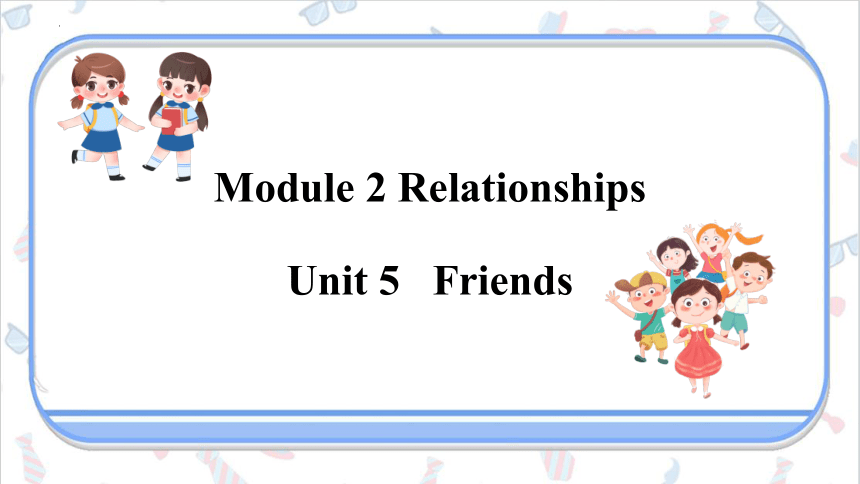
|
|
| 格式 | pptx | ||
| 文件大小 | 13.0MB | ||
| 资源类型 | 试卷 | ||
| 版本资源 | 牛津沪教版 | ||
| 科目 | 英语 | ||
| 更新时间 | 2023-10-18 14:16:33 | ||
图片预览

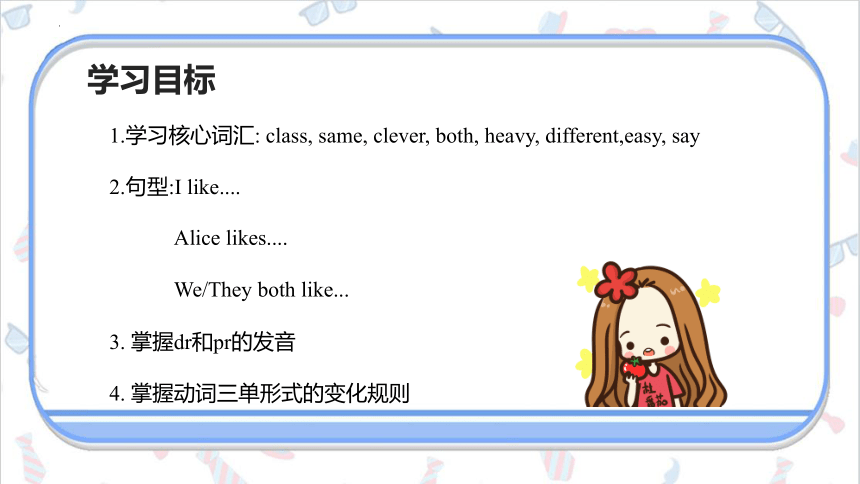
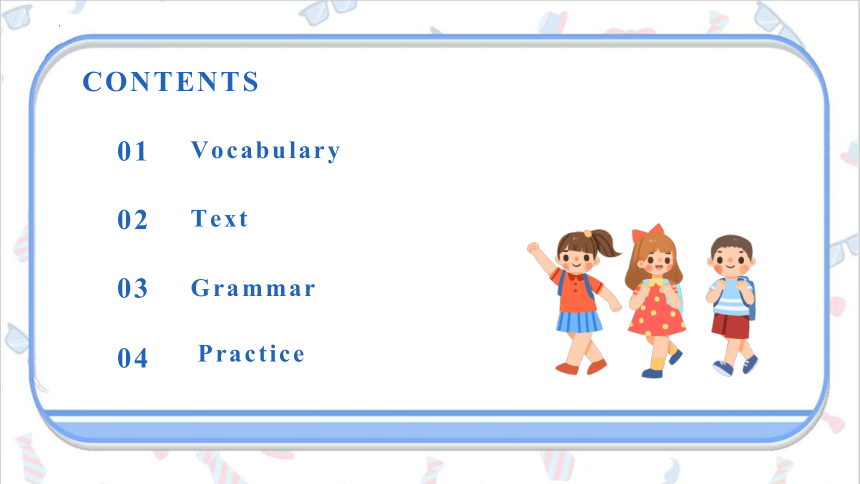
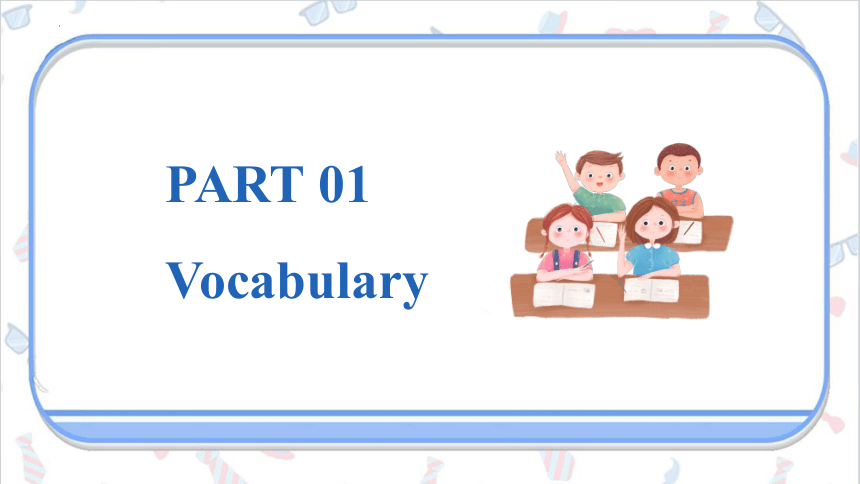
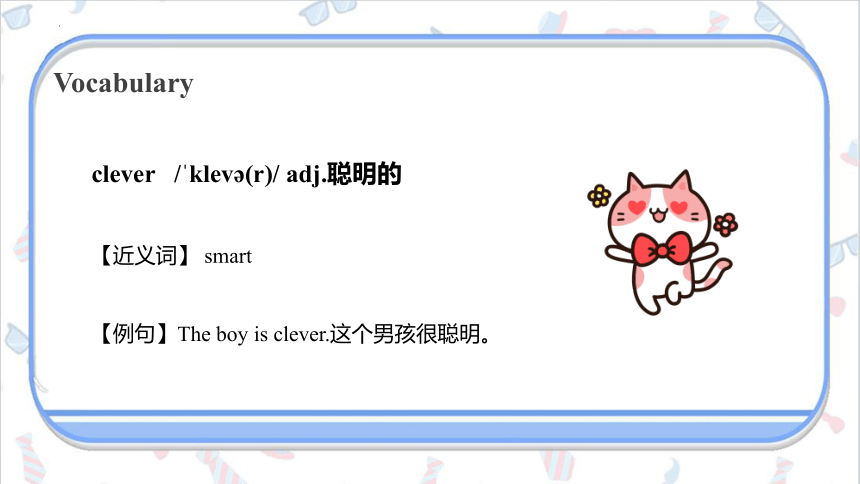
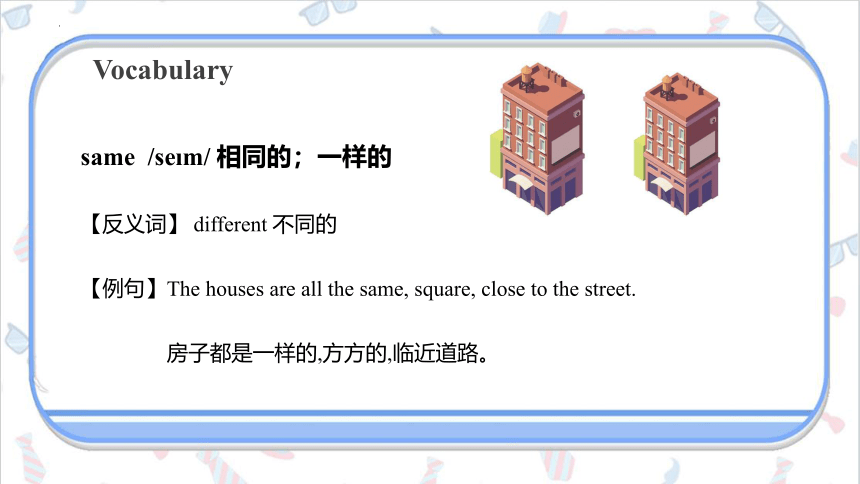
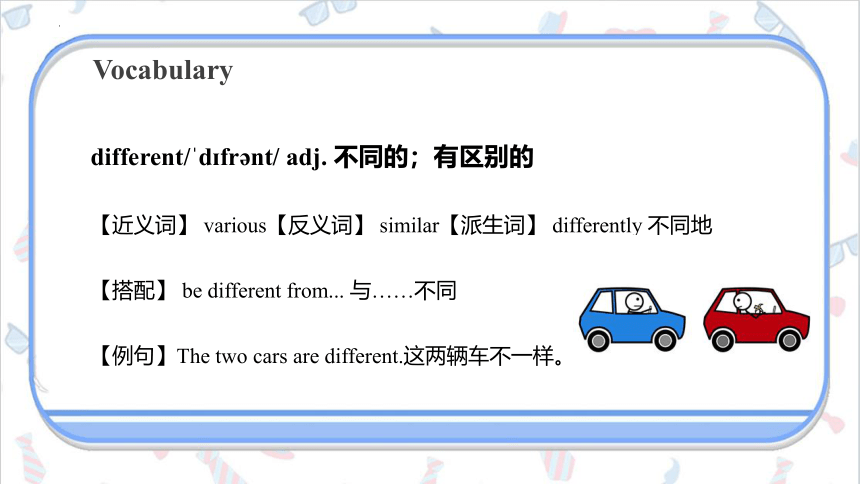

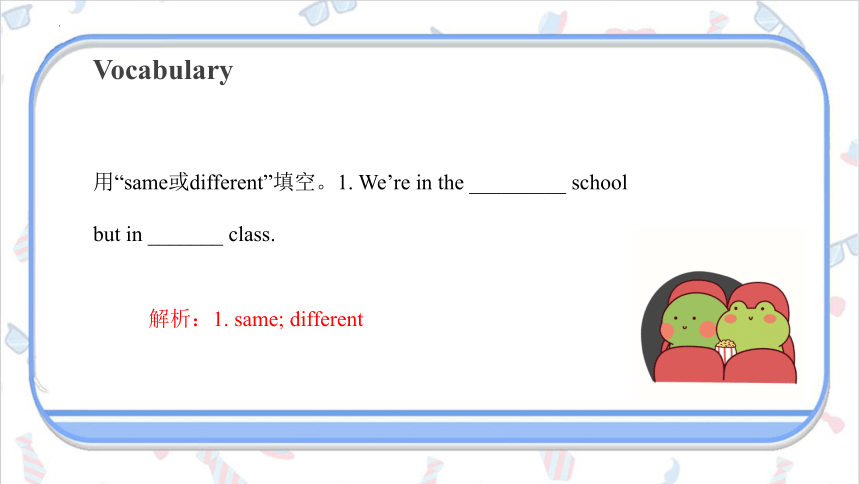
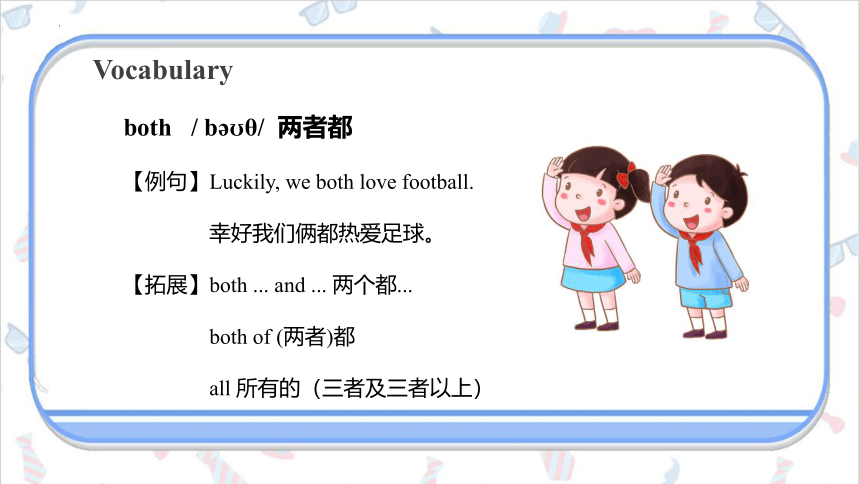
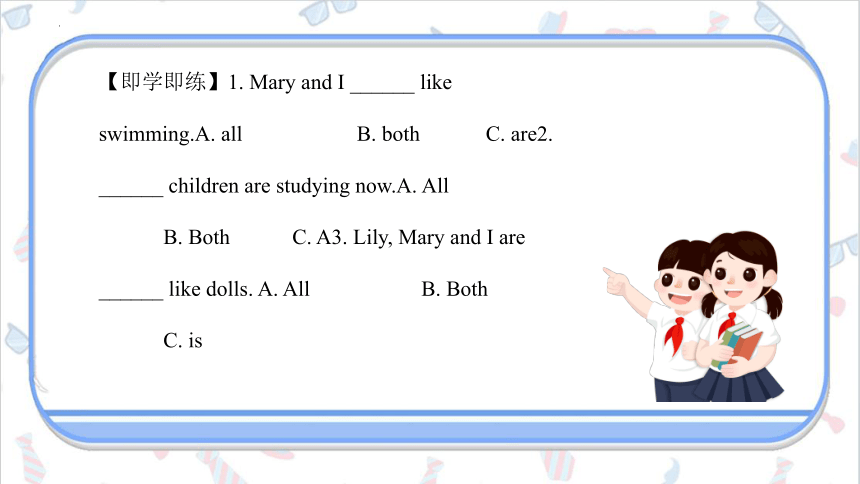
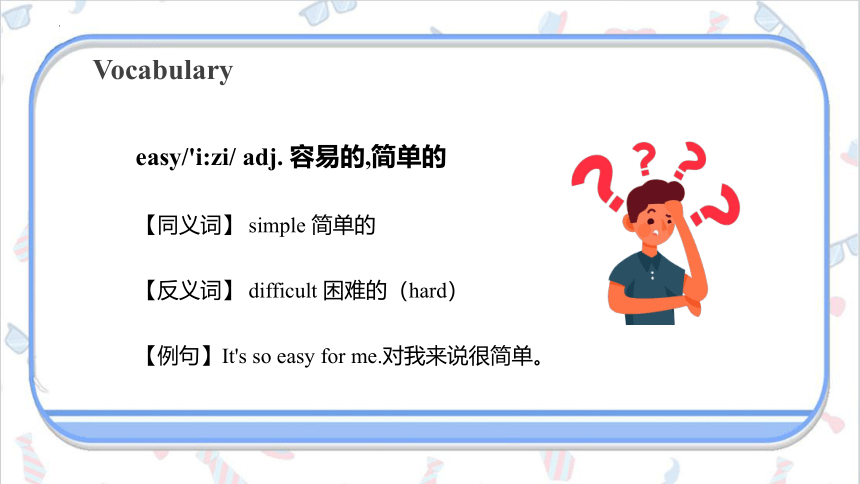
文档简介
Module 2 Relationships
Unit 5 Friends
1.学习核心词汇: class, same, clever, both, heavy, different,easy, say
2.句型:I like....
Alice likes....
We/They both like...
3. 掌握dr和pr的发音
4. 掌握动词三单形式的变化规则
学习目标
Vocabulary
01
Grammar
03
Text
02
Practice
04
CONTENTS
PART 01
Vocabulary
clever /?klev?(r)/ adj.聪明的
【近义词】 smart
【例句】The boy is clever.这个男孩很聪明。
Vocabulary
same /se?m/ 相同的;一样的
【反义词】 different 不同的
【例句】The houses are all the same, square, close to the street.
房子都是一样的,方方的,临近道路。
Vocabulary
Vocabulary
different/?d?fr?nt/ adj. 不同的;有区别的
【近义词】 various【反义词】 similar【派生词】 differently 不同地
【搭配】 be different from... 与……不同
【例句】The two cars are different.这两辆车不一样。
same vs. different
different 是“不同的”,它的反义词是“same”,意思是“同样的,同一的”。
same是形容词,意思是“相同的、同样的”,它是 different 的反义词,different 单独使用,但是same通常与 the 连用。
固定搭配:和……不同 be different from
和……相同 be the same as
Vocabulary
Vocabulary
用“same或different”填空。1. We’re in the _________ school but in _______ class.
解析:1. same; different
both / b??θ/ 两者都
【例句】Luckily, we both love football.
幸好我们俩都热爱足球。
【拓展】both ... and ... 两个都...
both of (两者)都
all 所有的(三者及三者以上)
Vocabulary
【即学即练】1. Mary and I ______ like swimming.A. all B. both C. are2. ______ children are studying now.A. All B. Both C. A3. Lily, Mary and I are ______ like dolls. A. All B. Both C. is
easy/'i:zi/ adj. 容易的,简单的
【同义词】 simple 简单的
【反义词】 difficult 困难的(hard)
【例句】It's so easy for me.对我来说很简单。
Vocabulary
Vocabulary
say /se?/ 说
【过去式 】said
【例句】The girl said goodbye loudly.
这个女孩大声说了再见。
speak、 say、 talk、 tell
speak“说、讲话”。强调说的能力。
speak+语言“说某种语言”。
She can speak French.
Vocabulary
speak、 say、 talk、 tell
say“说”,接说的内容。
I can say abc.
say hello to sb.向某人问好。
say sorry to sb.向某人道歉。
Vocabulary
Vocabulary
speak、 say、 talk、 tell
talk“谈论,交谈”。
① talk to sb. 对某人说话
② talk with sb. 同某人交谈
③ talk about/on 谈论
【例句】He is talking with his good friend.
speak、 say、 talk、 tell
tell “告诉,讲述”。
① tell sb. sth. = tell sth. to sb. 告诉某人某事
②tell a story 讲故事
③tell a lie 撒谎
④tell the truth讲实话
【例句】My grandfather often tells stories to me.
Vocabulary
heavy /?hevi/ adj. 重的
【反义词】light 轻的
【副词】heavily 重地
【例句】The traffic is heavy and slow. 车很多,走得慢。
Vocabulary
clever 聪明的
different 不同的
same 相同的
bored 无聊的
class 班;班级
word 单词
both (两个)都
easy 容易的
cross 穿越;越过
say 说
carry 背;提;拿
then 然后;那么
heavy 重的;沉的
ask 问
soon 很快;不久
answer 回答
Vocabulary
each other 互相
make a phone call 打电话
help people 帮助人们
cross the street 过马路
carry bags 提包;拿包
both like (两个)都喜欢
play word games 玩文字游戏
make phone calls 打电话
in the kitchen 在厨房里
in different classes 在不同的班级
my good friend 我的好朋友
walk into the forest 走进森林
PART 02
Text
Listen and say
Note:
1. same 相同的
in the same class 在相同的班级
same + 可数名词单数
我是凯蒂。我有一个朋友。她的名字叫爱丽丝。她是聪明的。我们在同一个班。
Listen and say
Note:
1. like v. 喜欢 ①like+动词ing 喜欢做...②like+名词 喜欢...
2. play + 球类运动
play table tennis 打乒乓球
play volleyball 打排球
3. both 两者
Listen and say
Note:
语法:一般现在时知识点:
both的用法,"两者都"
2. help sb do sth 帮助某人做某事
3. cross the street 过马路
4. carry heavy bags 拿重包
Listen and say
Note:
1. each other 互相;彼此
What do Kitty and Alice like? Match and say.
Are they the same or different?
same
/se?m/
different
/?d?fr?nt/
Look and say
A
B
C
D
E
F
S1: Are they the same or different? S2: They are the same/different.
Oliver reads some books at home.
The books are not interesting.
Then Oliver plays word games,
but they are too easy.
Oliver's mother is busy in the kitchen.
"Mum, I'm bored," says Oliver.
"What do you want to do then?" asks his mother.
"I don't know," answers Oliver.
"I have an idea!”says Oliver's mother. She makes some phone calls.
“Hello! This is Oliver's mother. Is that Ken? Can you come to my home?"
"Hello! ..”
Soon all Oliver's friends come.
Oliver is happy.
Listen and number
1
2
3
4
5
What does Oliver do when he is bored?
How are the books and the word games?
read some books
plays word games
not interesting
too easy
boring
Listen and number
( )“Mum, I’m bored,” says Oliver.
( )“What do you want to do then ? ”asks his mother.
( )“I don’t know ,” answers Oliver.
( )Oliver’s mother is busy in the kitchen.
1
2
3
4
Read and answer
(1)How does Oliver feel? Why?
( 2 )Does he know how to make himself happy?
( 3)How does he feel finally? Why?
Put the sentences in order.
a Oliver is happy. b Oliver plays word games.
c Oliver reads books. d Oliver's mother makes some phone calls.
e Oliver's friends come.
c
Do a survey
S1: Who's your good friend?
S2: is my good friend.... and ... are my good friends.
S1: Are you in the same class?
S2: Yes. We're both/all in Class..No. We're in different classes.
S1: Do you like the same sport?
S2: Yes. We both/all like..No. I like .. and ... likes...
Think and write
Listen and enjoy
Learn the sounds
PART 03
Grammar
like的用法like表示“喜欢”,后面可加动词或名词。①like+动词ing,表示“喜欢做...”,长时间喜欢指的是兴趣爱好;②like+ to+动词原形,表示“喜欢做...”,具体某一次的意愿;③like+名词,表示“喜欢...”。
一般现在时
一般现在时用来表示人或物经常性、习惯性的动作或状态,也可用来表示人或物现在的状态,也可表示客观真理。通常与副词every day(每天),always(总是),usually(通常),often(经常)sometimes(有时),等时间状语连用。
{5C22544A-7EE6-4342-B048-85BDC9FD1C3A}
always
usually
often
sometimes
never
词义
总是
通常
常常
有时
从不
大致频率
100%
80%
60%
40%
0%
一般现在时的句子构成:
??1.?be动词:主语+be(am, is, are)+其它。
如:I?am?a?boy.我是一个男孩。
2.行为动词:主语+行为动词(+其它)。
如:We?study?English.我们学习英语。
否定句、一般疑问句、特殊疑问句:
1.?be动词的变化。
①否定句:主语+?be?+?not?+其它。?如:He?is?not?a?worker.他不是工人。
②一般疑问句:Be?+主语+其它。
如: ---Are?you?a?student?? --- Yes.?I?am.?/?No,?I’m?not.
③特殊疑问句:疑问词+一般疑问句。如:Where?is?my?bike?
2.行为动词的变化。?
①否定句:主语+?don’t (?doesn’t?)?+动词原形(+其它)。
如:I?don’t?like?bread.
当主语为第三人称单数时,要用doesn’t构成否定句。
如:He?doesn’t?often?play.
②一般疑问句:Do(?Does?)?+主语+动词原形+其它。
如:--- Do?you?often?play?football?
????--- Yes,?I?do.?/?No,?I?don’t.
当主语为第三人称单数时,要用does构成一般疑问句。
如:--- Does?she?go?to?work?by?bike?
--- Yes,?she?does.?/?No,?she?doesn’t.
③特殊疑问句:疑问词+一般疑问句。
如:How?does?your?father?go?to?work?
一般现在时的动词形式?
一般现在时主要由动词原形表示,但第三人称单数后的动词词尾有所变化。
第三人称单数动词词尾的变化有几种形式:
①一般情况?加-s?reads,?says,?takes
②以ch,?sh,?s,?x,?或o结尾的词?加-es, teaches,?washes,?goes,?misses,?mixes?
③以辅音字母加y结尾的词?变y为i再加-es, studies,?cries,?carries?
④特殊:have-has
在一般现在时中,当主语是第三人称单数时,谓语动词要用第三人称单数形式。
一、人称代词he, she, it是第三人称单数。
如:
He likes watching TV. 他喜欢看电视。
She has lunch at twelve. 她十二点吃午餐。
在一般现在时中,当主语是第三人称单数时,谓语动词要用第三人称单数形式。
二、单个人名、地名或称呼作主语;是第三人称单数。
如:
①Han Mei likes salad. 韩梅喜欢萨拉。
②Beijing is in China. 北京在中国。
③Uncle Wang often plays volleyball. 王叔叔经常打排球。
在一般现在时中,当主语是第三人称单数时,谓语动词要用第三人称单数形式。
三、单数可数名词或"this / that / the+单数可数名词"作主语时,是第三人称单数。
如: ①This book is yours. 这本书是你的。
②That car is red. 那只猫是红色的。
③The cat is Lucy's. 这只猫是露茜的。
四、不定代词someone, somebody, nobody, everything, something等及指示代词this, that作主语时,是第三人称单数。
①Everyone is here. 大家到齐了。
②There is a watch on the table. 桌上有块手表。
③This is a pen. 这是一支钢笔。
④That is an eraser.
五、不可数名词作主语时为第三人称单数。如:
①The milk(牛奶) is in the glass. 牛奶在玻璃杯里。
②That bread is very small. 那面包很小。
六、当数字或字母作主语时,看作第三人称单数。如:
①"6" is a lucky number. "6"是个吉利数字。
②"I" is a letter. "I"是个字母。
用所给动词的适当形式填空。
1. Lin Tao (like) his ruler. 2. Let’s (have) ice cream.
3. Let’s (play) tennis! 4. He (like) English.
5. Nice (meet) you! 6. I (need) some fruits.
PART 04
Sentences
1. I’m Kitty. I have a friend. 我是凯蒂。我有一个朋友。
Her name’s Alice. She’s clever. 她叫爱丽丝。她很聪明。
We’re in the same class. 我们是在同一个班级。
2.We both like sport. 我们都喜欢运动。
I like playing table tennis and Alice likes playing volleyball.
我喜欢打乒乓球、爱丽丝喜欢打排球。
We both love animals. 我们都喜欢动物。
I have a cat and Alice has a dog. 我有一只猫、爱丽丝有一条狗。
3.We both like helping people. 大家都喜欢帮助别人。
We sometimes help old people cross the street.
我们有时会帮助老人过马路。
We also help them carry heavy bags.
我们还帮他们提很重的包。
4.We like each other. We’re good friends.
我们互相喜欢。我们是很好的朋友。
1.Oliver reads some books at home. The books are not interesting.
奥利弗在家读书。这些书没有趣。
2.Then Oliver plays word games, but they are too easy.
然后奥利弗玩文字游戏,但它们太简单了。
3.Oliver’s mother is busy in the kitchen. “Mum, I’m bored,” says Oliver. “What do you want to do then?” asks his mother. ” I don’t know,” answers Oliver.
奥利弗的妈妈正在厨房忙活。“妈妈,我觉得无聊,”奥利弗说。“那你想做什么?”他妈妈问道。“我不知道,”奥利弗回答。
4.”I have an idea!” says Oliver’s mother. She makes some phone calls. “Hello! This is Oliver’s mother. Is that Ken? Can you come to my home?” “Hello!…”
“我有个主意!”奥利弗的妈妈说。她打了一些电话。“你好!我是奥利弗的妈妈。你是肯吗?你能来我家吗?”“喂!……”
5.Soon all Oliver’s friends come. Oliver is happy.
很快奥利弗所有的朋友都来了。奥利弗很高兴。
I have a friend. She’s very small.
我有一位朋友。她十分小巧。
I always talk to her, but she doesn’t talk at all.
我经常跟她谈心,但是她不说话。
I have a friend. We both like to play. 我有一位朋友。我们都喜欢玩耍。
We go to the park almost every day. 我们几乎每天都去公园玩耍。
dr/dr/ – dress
pr/pr/ – princess
The princess has a dream. 公主做了一个梦。
In her dream, she puts on a pretty dress. 在梦里,她穿上了漂亮的裙子。
She walks into the forest and meets a handsome prince.
她走进森立遇到了一位帅气的王子。
PART 05
Practice
判断下列各组划线部分的发音是相同“A”还是不同“B”。
( )1.A.room B. food C. book
( )2. A. bread B. heavy C.ice-cream
( )3. A. same B. class C. name
( )4.A. both B. often C. other
( )5. A. car B. far C. star
把下列动词变成三单形式1.fly __________ 2. play __________ 3. go __________ 4. swim __________ 5. look __________ 6. watch __________7. have __________ 8. do __________ 9. study __________
从每小题的三个选项中选出最佳选项。
( )1. After half ____ hour, she gets off at the Spring Street Bus Stop.
A. a B. an C./
( )2. Tom is good at running. He wants to be a _______ in the future.
A. runner B. doctor C. swimmer
( )3. Mr. Black is a teacher. He teaches Math in a _________.
A. post office B.zoo C. school
( )4. Kitty is in Class One. Tim is in Class Six. They're in ________.
A. the same Class B. different classes C. different schools
从每小题的三个选项中选出最佳选项
( )5. Alice usually plays chess ______ her grandpa.
A. and B. at C. with
( )6. Monday is _______ day of week.
A. the first B. the seventh C. the second
( )7._______ is the fourth month of year.
A. April B. June C. May
( )8. We can meet ______ the bus stop ______ twelve o'clock.
A. at...in B. at...at C. at...on
根据所给情景选出适当的问句或答语。
( )1.-_______________ -She wants to be a nurse.
A. What does Peter want to be?
B. What does Kitty want to be?
C. What does Alice like?
( )2. - How do you come to school? - _________________
A. I live near the school.
B. I come to school on feet.
C. I come to school by car.
( )3.-- What do you usually do with your grandparents? - ______________
A. I can give them food.
B. I love my grandparents.
C. I usually go shopping with them.
( )4.-________________ - I'm sleeping in bed. I'm feeling a little tired.
A. What are doing, Paul? B. Where are you, Jack? C. What can you do, Peter?
( )5.-__________________ -I like playing volleyball.
A. What sport do you like? B. What animals do you like?
C. What food do you like?
判断下列句子是否与短文相符,相符写A,不相符写 B.
Mary is a little girl. She is only four. She is not at school. She doesn't know how to read or write. But her sister Joan is a schoolgirl. She is ten years old. She knows how to read and write.One day, Joan sees her little sister in the room. She is at the table. She has a pencil in her hand. She is writing. "What are you writing, Mary?" She asks. "I'm writing a letter to my friend Rose.""But how can you? You don't know how to write," says her sister."Well." says Mary, "It doesn't matter. Rose doesn't know how to read."
判断下列句子是否与短文相符,相符写A,不相符写 B.
( )1. Mary is a school girl.
( )2. Joan can read and write.
( )3. Mary is writing a letter to Rose.
( )4. Mary is a fun little girl.
阅读下列短文,从每小题的三个选项中选出最佳选项。
On a sunny spring day, Dad, Mom, Jack and Emily are in the car. They are going to have a picnic.They stop by the lake.
Look! The children put on their hats and play ball. But the wind blows Emily's hat away. Dad is fishing. He wants to catch a big fish in the lake. But he catches Emily's hat. He gives the hat to Emily. Then they are all hungry.Mom takes the picnic basket from the car and the other three help put the food on the pienic blanket. They have cheeseburgers, apples and orange juice. What a nice day!
阅读下列短文,从每小题的三个选项中选出最佳选项。
( )1. The family has a picnic _______.
A. on a sunny summer day B. near the lake C. by a river
( )2. Look!______ is carrying the picnic basket.
A. Jack B. Dad C. Mom
阅读下列短文,从每小题的三个选项中选出最佳选项。
( )3. Dad catches _______.
A. a big fish B. Emily's hat C. Jack's ball
( )4. They don't have ________ for the picnic.
A. cheeseburgers B. apples C. pears
Thank you!
Unit 5 Friends
1.学习核心词汇: class, same, clever, both, heavy, different,easy, say
2.句型:I like....
Alice likes....
We/They both like...
3. 掌握dr和pr的发音
4. 掌握动词三单形式的变化规则
学习目标
Vocabulary
01
Grammar
03
Text
02
Practice
04
CONTENTS
PART 01
Vocabulary
clever /?klev?(r)/ adj.聪明的
【近义词】 smart
【例句】The boy is clever.这个男孩很聪明。
Vocabulary
same /se?m/ 相同的;一样的
【反义词】 different 不同的
【例句】The houses are all the same, square, close to the street.
房子都是一样的,方方的,临近道路。
Vocabulary
Vocabulary
different/?d?fr?nt/ adj. 不同的;有区别的
【近义词】 various【反义词】 similar【派生词】 differently 不同地
【搭配】 be different from... 与……不同
【例句】The two cars are different.这两辆车不一样。
same vs. different
different 是“不同的”,它的反义词是“same”,意思是“同样的,同一的”。
same是形容词,意思是“相同的、同样的”,它是 different 的反义词,different 单独使用,但是same通常与 the 连用。
固定搭配:和……不同 be different from
和……相同 be the same as
Vocabulary
Vocabulary
用“same或different”填空。1. We’re in the _________ school but in _______ class.
解析:1. same; different
both / b??θ/ 两者都
【例句】Luckily, we both love football.
幸好我们俩都热爱足球。
【拓展】both ... and ... 两个都...
both of (两者)都
all 所有的(三者及三者以上)
Vocabulary
【即学即练】1. Mary and I ______ like swimming.A. all B. both C. are2. ______ children are studying now.A. All B. Both C. A3. Lily, Mary and I are ______ like dolls. A. All B. Both C. is
easy/'i:zi/ adj. 容易的,简单的
【同义词】 simple 简单的
【反义词】 difficult 困难的(hard)
【例句】It's so easy for me.对我来说很简单。
Vocabulary
Vocabulary
say /se?/ 说
【过去式 】said
【例句】The girl said goodbye loudly.
这个女孩大声说了再见。
speak、 say、 talk、 tell
speak“说、讲话”。强调说的能力。
speak+语言“说某种语言”。
She can speak French.
Vocabulary
speak、 say、 talk、 tell
say“说”,接说的内容。
I can say abc.
say hello to sb.向某人问好。
say sorry to sb.向某人道歉。
Vocabulary
Vocabulary
speak、 say、 talk、 tell
talk“谈论,交谈”。
① talk to sb. 对某人说话
② talk with sb. 同某人交谈
③ talk about/on 谈论
【例句】He is talking with his good friend.
speak、 say、 talk、 tell
tell “告诉,讲述”。
① tell sb. sth. = tell sth. to sb. 告诉某人某事
②tell a story 讲故事
③tell a lie 撒谎
④tell the truth讲实话
【例句】My grandfather often tells stories to me.
Vocabulary
heavy /?hevi/ adj. 重的
【反义词】light 轻的
【副词】heavily 重地
【例句】The traffic is heavy and slow. 车很多,走得慢。
Vocabulary
clever 聪明的
different 不同的
same 相同的
bored 无聊的
class 班;班级
word 单词
both (两个)都
easy 容易的
cross 穿越;越过
say 说
carry 背;提;拿
then 然后;那么
heavy 重的;沉的
ask 问
soon 很快;不久
answer 回答
Vocabulary
each other 互相
make a phone call 打电话
help people 帮助人们
cross the street 过马路
carry bags 提包;拿包
both like (两个)都喜欢
play word games 玩文字游戏
make phone calls 打电话
in the kitchen 在厨房里
in different classes 在不同的班级
my good friend 我的好朋友
walk into the forest 走进森林
PART 02
Text
Listen and say
Note:
1. same 相同的
in the same class 在相同的班级
same + 可数名词单数
我是凯蒂。我有一个朋友。她的名字叫爱丽丝。她是聪明的。我们在同一个班。
Listen and say
Note:
1. like v. 喜欢 ①like+动词ing 喜欢做...②like+名词 喜欢...
2. play + 球类运动
play table tennis 打乒乓球
play volleyball 打排球
3. both 两者
Listen and say
Note:
语法:一般现在时知识点:
both的用法,"两者都"
2. help sb do sth 帮助某人做某事
3. cross the street 过马路
4. carry heavy bags 拿重包
Listen and say
Note:
1. each other 互相;彼此
What do Kitty and Alice like? Match and say.
Are they the same or different?
same
/se?m/
different
/?d?fr?nt/
Look and say
A
B
C
D
E
F
S1: Are they the same or different? S2: They are the same/different.
Oliver reads some books at home.
The books are not interesting.
Then Oliver plays word games,
but they are too easy.
Oliver's mother is busy in the kitchen.
"Mum, I'm bored," says Oliver.
"What do you want to do then?" asks his mother.
"I don't know," answers Oliver.
"I have an idea!”says Oliver's mother. She makes some phone calls.
“Hello! This is Oliver's mother. Is that Ken? Can you come to my home?"
"Hello! ..”
Soon all Oliver's friends come.
Oliver is happy.
Listen and number
1
2
3
4
5
What does Oliver do when he is bored?
How are the books and the word games?
read some books
plays word games
not interesting
too easy
boring
Listen and number
( )“Mum, I’m bored,” says Oliver.
( )“What do you want to do then ? ”asks his mother.
( )“I don’t know ,” answers Oliver.
( )Oliver’s mother is busy in the kitchen.
1
2
3
4
Read and answer
(1)How does Oliver feel? Why?
( 2 )Does he know how to make himself happy?
( 3)How does he feel finally? Why?
Put the sentences in order.
a Oliver is happy. b Oliver plays word games.
c Oliver reads books. d Oliver's mother makes some phone calls.
e Oliver's friends come.
c
Do a survey
S1: Who's your good friend?
S2: is my good friend.... and ... are my good friends.
S1: Are you in the same class?
S2: Yes. We're both/all in Class..No. We're in different classes.
S1: Do you like the same sport?
S2: Yes. We both/all like..No. I like .. and ... likes...
Think and write
Listen and enjoy
Learn the sounds
PART 03
Grammar
like的用法like表示“喜欢”,后面可加动词或名词。①like+动词ing,表示“喜欢做...”,长时间喜欢指的是兴趣爱好;②like+ to+动词原形,表示“喜欢做...”,具体某一次的意愿;③like+名词,表示“喜欢...”。
一般现在时
一般现在时用来表示人或物经常性、习惯性的动作或状态,也可用来表示人或物现在的状态,也可表示客观真理。通常与副词every day(每天),always(总是),usually(通常),often(经常)sometimes(有时),等时间状语连用。
{5C22544A-7EE6-4342-B048-85BDC9FD1C3A}
always
usually
often
sometimes
never
词义
总是
通常
常常
有时
从不
大致频率
100%
80%
60%
40%
0%
一般现在时的句子构成:
??1.?be动词:主语+be(am, is, are)+其它。
如:I?am?a?boy.我是一个男孩。
2.行为动词:主语+行为动词(+其它)。
如:We?study?English.我们学习英语。
否定句、一般疑问句、特殊疑问句:
1.?be动词的变化。
①否定句:主语+?be?+?not?+其它。?如:He?is?not?a?worker.他不是工人。
②一般疑问句:Be?+主语+其它。
如: ---Are?you?a?student?? --- Yes.?I?am.?/?No,?I’m?not.
③特殊疑问句:疑问词+一般疑问句。如:Where?is?my?bike?
2.行为动词的变化。?
①否定句:主语+?don’t (?doesn’t?)?+动词原形(+其它)。
如:I?don’t?like?bread.
当主语为第三人称单数时,要用doesn’t构成否定句。
如:He?doesn’t?often?play.
②一般疑问句:Do(?Does?)?+主语+动词原形+其它。
如:--- Do?you?often?play?football?
????--- Yes,?I?do.?/?No,?I?don’t.
当主语为第三人称单数时,要用does构成一般疑问句。
如:--- Does?she?go?to?work?by?bike?
--- Yes,?she?does.?/?No,?she?doesn’t.
③特殊疑问句:疑问词+一般疑问句。
如:How?does?your?father?go?to?work?
一般现在时的动词形式?
一般现在时主要由动词原形表示,但第三人称单数后的动词词尾有所变化。
第三人称单数动词词尾的变化有几种形式:
①一般情况?加-s?reads,?says,?takes
②以ch,?sh,?s,?x,?或o结尾的词?加-es, teaches,?washes,?goes,?misses,?mixes?
③以辅音字母加y结尾的词?变y为i再加-es, studies,?cries,?carries?
④特殊:have-has
在一般现在时中,当主语是第三人称单数时,谓语动词要用第三人称单数形式。
一、人称代词he, she, it是第三人称单数。
如:
He likes watching TV. 他喜欢看电视。
She has lunch at twelve. 她十二点吃午餐。
在一般现在时中,当主语是第三人称单数时,谓语动词要用第三人称单数形式。
二、单个人名、地名或称呼作主语;是第三人称单数。
如:
①Han Mei likes salad. 韩梅喜欢萨拉。
②Beijing is in China. 北京在中国。
③Uncle Wang often plays volleyball. 王叔叔经常打排球。
在一般现在时中,当主语是第三人称单数时,谓语动词要用第三人称单数形式。
三、单数可数名词或"this / that / the+单数可数名词"作主语时,是第三人称单数。
如: ①This book is yours. 这本书是你的。
②That car is red. 那只猫是红色的。
③The cat is Lucy's. 这只猫是露茜的。
四、不定代词someone, somebody, nobody, everything, something等及指示代词this, that作主语时,是第三人称单数。
①Everyone is here. 大家到齐了。
②There is a watch on the table. 桌上有块手表。
③This is a pen. 这是一支钢笔。
④That is an eraser.
五、不可数名词作主语时为第三人称单数。如:
①The milk(牛奶) is in the glass. 牛奶在玻璃杯里。
②That bread is very small. 那面包很小。
六、当数字或字母作主语时,看作第三人称单数。如:
①"6" is a lucky number. "6"是个吉利数字。
②"I" is a letter. "I"是个字母。
用所给动词的适当形式填空。
1. Lin Tao (like) his ruler. 2. Let’s (have) ice cream.
3. Let’s (play) tennis! 4. He (like) English.
5. Nice (meet) you! 6. I (need) some fruits.
PART 04
Sentences
1. I’m Kitty. I have a friend. 我是凯蒂。我有一个朋友。
Her name’s Alice. She’s clever. 她叫爱丽丝。她很聪明。
We’re in the same class. 我们是在同一个班级。
2.We both like sport. 我们都喜欢运动。
I like playing table tennis and Alice likes playing volleyball.
我喜欢打乒乓球、爱丽丝喜欢打排球。
We both love animals. 我们都喜欢动物。
I have a cat and Alice has a dog. 我有一只猫、爱丽丝有一条狗。
3.We both like helping people. 大家都喜欢帮助别人。
We sometimes help old people cross the street.
我们有时会帮助老人过马路。
We also help them carry heavy bags.
我们还帮他们提很重的包。
4.We like each other. We’re good friends.
我们互相喜欢。我们是很好的朋友。
1.Oliver reads some books at home. The books are not interesting.
奥利弗在家读书。这些书没有趣。
2.Then Oliver plays word games, but they are too easy.
然后奥利弗玩文字游戏,但它们太简单了。
3.Oliver’s mother is busy in the kitchen. “Mum, I’m bored,” says Oliver. “What do you want to do then?” asks his mother. ” I don’t know,” answers Oliver.
奥利弗的妈妈正在厨房忙活。“妈妈,我觉得无聊,”奥利弗说。“那你想做什么?”他妈妈问道。“我不知道,”奥利弗回答。
4.”I have an idea!” says Oliver’s mother. She makes some phone calls. “Hello! This is Oliver’s mother. Is that Ken? Can you come to my home?” “Hello!…”
“我有个主意!”奥利弗的妈妈说。她打了一些电话。“你好!我是奥利弗的妈妈。你是肯吗?你能来我家吗?”“喂!……”
5.Soon all Oliver’s friends come. Oliver is happy.
很快奥利弗所有的朋友都来了。奥利弗很高兴。
I have a friend. She’s very small.
我有一位朋友。她十分小巧。
I always talk to her, but she doesn’t talk at all.
我经常跟她谈心,但是她不说话。
I have a friend. We both like to play. 我有一位朋友。我们都喜欢玩耍。
We go to the park almost every day. 我们几乎每天都去公园玩耍。
dr/dr/ – dress
pr/pr/ – princess
The princess has a dream. 公主做了一个梦。
In her dream, she puts on a pretty dress. 在梦里,她穿上了漂亮的裙子。
She walks into the forest and meets a handsome prince.
她走进森立遇到了一位帅气的王子。
PART 05
Practice
判断下列各组划线部分的发音是相同“A”还是不同“B”。
( )1.A.room B. food C. book
( )2. A. bread B. heavy C.ice-cream
( )3. A. same B. class C. name
( )4.A. both B. often C. other
( )5. A. car B. far C. star
把下列动词变成三单形式1.fly __________ 2. play __________ 3. go __________ 4. swim __________ 5. look __________ 6. watch __________7. have __________ 8. do __________ 9. study __________
从每小题的三个选项中选出最佳选项。
( )1. After half ____ hour, she gets off at the Spring Street Bus Stop.
A. a B. an C./
( )2. Tom is good at running. He wants to be a _______ in the future.
A. runner B. doctor C. swimmer
( )3. Mr. Black is a teacher. He teaches Math in a _________.
A. post office B.zoo C. school
( )4. Kitty is in Class One. Tim is in Class Six. They're in ________.
A. the same Class B. different classes C. different schools
从每小题的三个选项中选出最佳选项
( )5. Alice usually plays chess ______ her grandpa.
A. and B. at C. with
( )6. Monday is _______ day of week.
A. the first B. the seventh C. the second
( )7._______ is the fourth month of year.
A. April B. June C. May
( )8. We can meet ______ the bus stop ______ twelve o'clock.
A. at...in B. at...at C. at...on
根据所给情景选出适当的问句或答语。
( )1.-_______________ -She wants to be a nurse.
A. What does Peter want to be?
B. What does Kitty want to be?
C. What does Alice like?
( )2. - How do you come to school? - _________________
A. I live near the school.
B. I come to school on feet.
C. I come to school by car.
( )3.-- What do you usually do with your grandparents? - ______________
A. I can give them food.
B. I love my grandparents.
C. I usually go shopping with them.
( )4.-________________ - I'm sleeping in bed. I'm feeling a little tired.
A. What are doing, Paul? B. Where are you, Jack? C. What can you do, Peter?
( )5.-__________________ -I like playing volleyball.
A. What sport do you like? B. What animals do you like?
C. What food do you like?
判断下列句子是否与短文相符,相符写A,不相符写 B.
Mary is a little girl. She is only four. She is not at school. She doesn't know how to read or write. But her sister Joan is a schoolgirl. She is ten years old. She knows how to read and write.One day, Joan sees her little sister in the room. She is at the table. She has a pencil in her hand. She is writing. "What are you writing, Mary?" She asks. "I'm writing a letter to my friend Rose.""But how can you? You don't know how to write," says her sister."Well." says Mary, "It doesn't matter. Rose doesn't know how to read."
判断下列句子是否与短文相符,相符写A,不相符写 B.
( )1. Mary is a school girl.
( )2. Joan can read and write.
( )3. Mary is writing a letter to Rose.
( )4. Mary is a fun little girl.
阅读下列短文,从每小题的三个选项中选出最佳选项。
On a sunny spring day, Dad, Mom, Jack and Emily are in the car. They are going to have a picnic.They stop by the lake.
Look! The children put on their hats and play ball. But the wind blows Emily's hat away. Dad is fishing. He wants to catch a big fish in the lake. But he catches Emily's hat. He gives the hat to Emily. Then they are all hungry.Mom takes the picnic basket from the car and the other three help put the food on the pienic blanket. They have cheeseburgers, apples and orange juice. What a nice day!
阅读下列短文,从每小题的三个选项中选出最佳选项。
( )1. The family has a picnic _______.
A. on a sunny summer day B. near the lake C. by a river
( )2. Look!______ is carrying the picnic basket.
A. Jack B. Dad C. Mom
阅读下列短文,从每小题的三个选项中选出最佳选项。
( )3. Dad catches _______.
A. a big fish B. Emily's hat C. Jack's ball
( )4. They don't have ________ for the picnic.
A. cheeseburgers B. apples C. pears
Thank you!
同课章节目录
- Module 1 Getting to know each othe
- Unit 1 My future
- Unit 2 Going to school
- Unit 3 My birthday
- Module 2 Relationships
- Unit 4 Grandparents
- Unit 5 Friends
- Unit 6 Family life
- Module 3 Out and about
- Unit 7 At the beach
- Unit 8 An outing
- Unit 9 Around the city
- Module 4 The natural world
- Unit 10 Wind
- Unit 11 Water
- Unit 12 Fire
